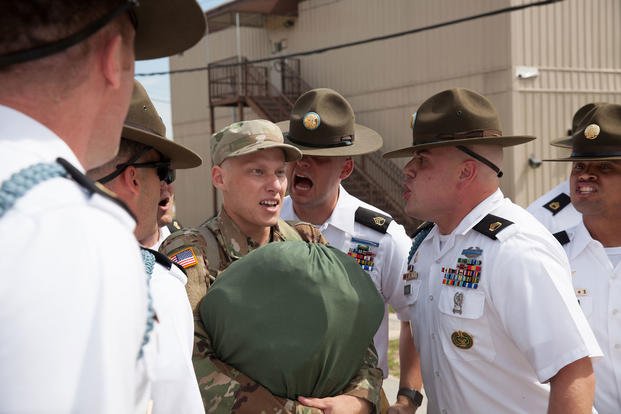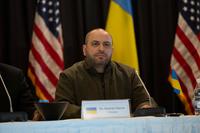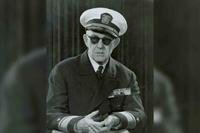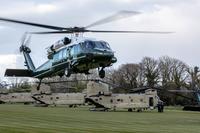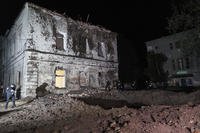The opinions expressed in this op-ed are those of the author and do not necessarily reflect the views of Military.com. If you would like to submit your own commentary, please send your article to opinions@military.com for consideration.
You would think that Congress, national security policymakers, and generals and admirals would have learned by now. You would think that after our nation has burned our hands on the national security stove so often and after filling Arlington National Cemetery to near capacity, it would awaken even the most callous or politically zealous to cause and effect. Spoiler alert: It hasn't. This essay is for them.
Those who create and govern our national security should be required to take a test. The test is simple, but note that the passing grade is 100%. "Describe the significance of the following events in recent American history: Kasserine Pass, the Doolittle Board, Task Force Smith and Project 100,000." Answers to the test follow.
Kasserine Pass
Although World War II began in 1939, the American military only slowly began to prepare. The Pearl Harbor attack in 1941 shocked the nation into organizing for war, but when the first force-on-force engagement with German forces occurred 15 months later, it was a disaster.
Numerically inferior German forces attacked combined American and British forces guarding highly defensible positions in the Atlas Mountains of Tunisia. American forces were not only routed but retreated nearly 50 miles. Our Army lost 3,300 men, with another 3,000 captured, and 183 tanks were lost compared to only 20 by the Germans.
Long overdue reforms to leadership and warfighting skills began shortly afterward, but that hardly comforted families for the loss of their sons.
The Doolittle Board
In 1946, with clamor in Congress and the media for a more rapid demobilization and reforms to what was considered a caste system in the Army, Secretary of War Robert P. Patterson convened the Secretary of War's Board on Officer-Enlisted Man Relationships (popularly called The Doolittle Board after its chairman, Lt. Gen. Jimmy Doolittle).
As a result of the recommendations of this board, overdue reforms to officer and enlisted legal systems and other conditions in officer and enlisted service began to change, but then the pendulum swung too far. Unfortunately (as is often the case), the psychology and momentum of the changes gained a life of their own and led to what the advocates referred to as "democratization." Spartans became laborers. Service became a job. Discipline -- a fundamental and critical requirement in what necessarily must be grueling preparations for the horrors of war -- faltered as both officers and noncommissioned officer (NCO) leaders became timid in enforcing standards.
A general view is that things like good order and discipline were not terribly essential in future wars, because nuclear weapons had made conventional ground combat passé. Rigor gave way to comfort with entirely predictable consequences … as the next event demonstrated.
Task Force Smith
With four years of the Doolittle Board's corrosive effects in place, the Korean conflict began with North Korea's invasion of the South. A U.S. Army that (after the Kasserine Pass debacle) performed with distinction against the German Army in WWII quickly responded to delay the North Korean advance. The general estimation at the time was that the North Koreans, as a third- or fourth-rate army, could be handled by the world's great superpower.
The first U.S. Army unit on scene, Task Force Smith, confronted a North Korean Army unit near Osan and, after fighting for three hours, was routed, abandoning both its equipment and wounded (who were executed by the North Koreans).
Leadership, equipment and training failures are cited as contributing factors to the rout, but the pernicious effects of the Doolittle Board mentality were a major factor, as T. R. Fehrenbach outlined in his book "This Kind of War: A Study in Unpreparedness."
The U.S. Army leadership's response afterward was to promise, "No more Task Force Smiths." Their predecessors might have said, "No more Kasserine Passes." The many dead didn't have a voice.
Project 100,000
In 1966, as the Vietnam War escalated and draft requirements increased, the Department of Defense instituted a social program that was broadcast as part of President Lyndon B. Johnson's War on Poverty -- "Project 100,000." With great certainty, but nearly incomprehensible blindness to consequences, the DoD referred to these targets for recruitment as "New Standards Men."
The project ultimately enlisted more than 320,000 who otherwise would not have qualified for military service because of low mental aptitude (91% of them) or for what would ordinarily be medical disqualifiers. These were not minor waivers. A sizable number of those who tested in this lowest mental category were illiterate.
As they tested so low in aptitude, a majority were assigned to the ground combat arms. Defense Secretary Robert McNamara justified this attempt to help society by indicating that contemporary wars were now dominated by technology. Sound familiar?
The quantifiable results of the New Standards Men are that they were three times more likely to be killed in action. Project 100,000 recruits had higher disciplinary rates, twice as many were discharged before they completed their obligated service, and post-war outcomes were worse than those who did not serve. What's not quantifiable was equally certain. The higher disciplinary rates, additional supervision, higher drug use, etc., greatly frustrated their peers and first-level leaders (junior officers and NCOs). Please don't confuse the discipline and mental aptitude issues with mere inconveniences: When instant judgments and actions were required in combat, these conditions could be deadly to both their comrades in arms and innocent civilians.
A correct answer to this four-topic test, then, is that when policymakers (including generals) try to soften or "democratize" the standards of the military, there are grave consequences that are not theoretical but demonstrable: the defeat and great numbers of dead young Americans. This "butcher's bill" is, of course, paid largely by the middle and lower classes and not by the offspring of the elites -- playing poker with someone else's chips.
The Supreme Court has long appreciated the distinct requirements of military service even if Congress and successive administrations have not. Chief Justice Earl Warren, hardly a host of conservative judicial philosophy, put it this way: "[I]t is indisputable that the tradition of our country, from the time of the revolution until now, has supported the military establishment's broad power to deal with its own personnel. The most obvious reason is that Courts are ill-equipped to determine the impact upon discipline that any particular intrusion upon military authority might have."
This opinion and other rulings are broadly referred to as the Orloff rule (Orloff v. Willoughby, 1953). What the rulings signify is that what may be acceptable or even desirable in civilian society does not apply to an institution whose requirements are based on the need for illogical human response to grave danger.
There is another consequence to ignoring these inconvenient truths. When potential foes interpret softness in our armed forces (by their standards, not ours), they are encouraged to challenge us. The simple and historical truth is that if you want less war, you need to be considered the toughest presence on the global block.
American history teaches us that our admirable adherence to tenets of democratic values, coupled with either ignorance about or apathetic indifference to military bedrock requirements, causes nearly endless repetition of mistakes in preparing our armed forces for war. Said less politely, "democratizing" an institution whose often lethal duties require nothing approaching democratic processes already has caused the deaths of thousands of young Americans. Who do you want guarding the flock -- one of the sheep or a sheep dog?
Current evidence: Some lawmakers, the White House, senior Department of Defense officials, and some of the most senior officers in the military say that climate change is one of the top national security threats to the country. At the same time, I believe military officials are putting too much emphasis on "equity" rather than merit and are no longer emphasizing lethality as the overarching intent of policies as former Defense Secretary Jim Mattis did, which draws more attention to ethnic distinctions in a culture that relies on cohesion. When one sees those conditions merging as they are now, start recording their sponsors' names, because they will be the authors of the next catastrophe.
So, we now have a fifth question for this military leadership test. "What are the consequences of democratizing the military during the period 2009-2023?" The correct answer is important. Our sons and daughters' lives may depend on it.
-- Lt. Gen. Greg Newbold served as a Marine infantry officer and commanded at every level from platoon through the 1st Marine Division. His last posting was as director of operations (J-3) for the Joint Staff in the Pentagon.
